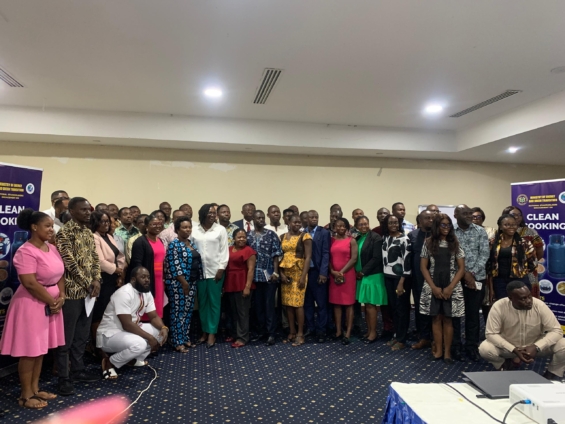The Ministry of Energy and Green Transition is holding a national stakeholder’ engagement to gather input for a new Clean Cooking Policy and Strategy.
This roadmap aims to achieve universal access to clean cooking, with a target of 50% LPG usage by 2030, up from the current 36.9%.
Head of the Clean Cooking Unit, Doris Duodo, stressed the alarming impact of the use of firewood and charcoal. She emphasised that these traditional fuels release harmful smoke, causing severe respiratory diseases, heart conditions, and maternal health complications.
“A large number of people die yearly from the effects of smoke inhalation and related health issues, and it’s quite more than 1,000. Between 7,000 to 10,000 people die yearly from smoke inhalation,” she observed. Mrs. Duodo highlighted that clean cooking will reduce exposure to harmful pollutants that cause lung diseases, eye irritation, and cardiovascular issues, particularly affecting women and children.
The improved cooking stoves are being promoted to reduce charcoal consumption, minimize deforestation, and eliminate smoke exposure.
To make clean cooking accessible, the government has introduced the Cylinder Recirculation Model (CRM) in which “small cages called CRM are being made, already filled with gas, and placed at nearby locations where individuals can purchase at a cost without going to gas stations”.
Mrs. Duodu also emphasised safety education for LPG users, particularly in rural areas.
Deputy Director for Renewable Energy and Green Transition, Dr. Robert Sobagyi, noted that reliance on firewood and charcoal contributes to deforestation and environmental degradation, warning that it has a broader impact on the country.

“When we don’t do clean cooking, we affect the environment and we also affect our health. This clean cooking promotion is meant to use LPG and electric cooking to increase environmental protection and reduce maternal mortality, which is due to using bad fuel technology,” he said.
He also criticised harmful practices such as burning tires in abattoirs, which release toxic chemicals into the air. Mr.Sobagyi embraces clean cooking to ensure that poisonous materials are not released into the atmosphere, which causes illnesses and reduces life expectancy. Ghana’s Clean Cooking Initiative is a crucial step in tackling respiratory diseases, maternal health risks, deforestation, and air pollution.
With policy implementation, stakeholder engagement, and public education, Ghana is on track to achieving its 50% LPG usage target by 2030, ensuring a healthier and more sustainable future.
Latest Stories
-
Delivery of quality education: rehabilitation of classroom blocks enhances learning environment in North Tongu
1 hour -
Let Ghanaians know what happened to the Vice President on Friday – NPP
1 hour -
Tarkwa TNA Stadium to host MTN FA Cup semis
1 hour -
‘The aim of every coach is to win trophies’ – Prosper Ogum
2 hours -
Gold discovered in seven districts of Upper East Region – Minister
3 hours -
Ahafo Regional Minister raises alarm over rising drug abuse among youth
3 hours -
Tomato paste research: Who will give the consumer some clarity?
3 hours -
Fidelity Bank launches initiative to empower journalists in financial reporting
3 hours -
Fidelity Bank commits to implementing growth-oriented initiatives
3 hours -
DCOP Rtd David Eklu: Motorbike safety during the holidays
3 hours -
Absa Bank Ghana hosts NBFI learning event to drive inclusive job creation
4 hours -
Greenland’s prime minister says the US will not get the island
4 hours -
Trump says Zelensky wants to back out of critical minerals deal
4 hours -
US judge halts deportation of Turkish student at Tufts
4 hours -
US FAA to investigate close call between Delta flight and Air Force jet
5 hours

